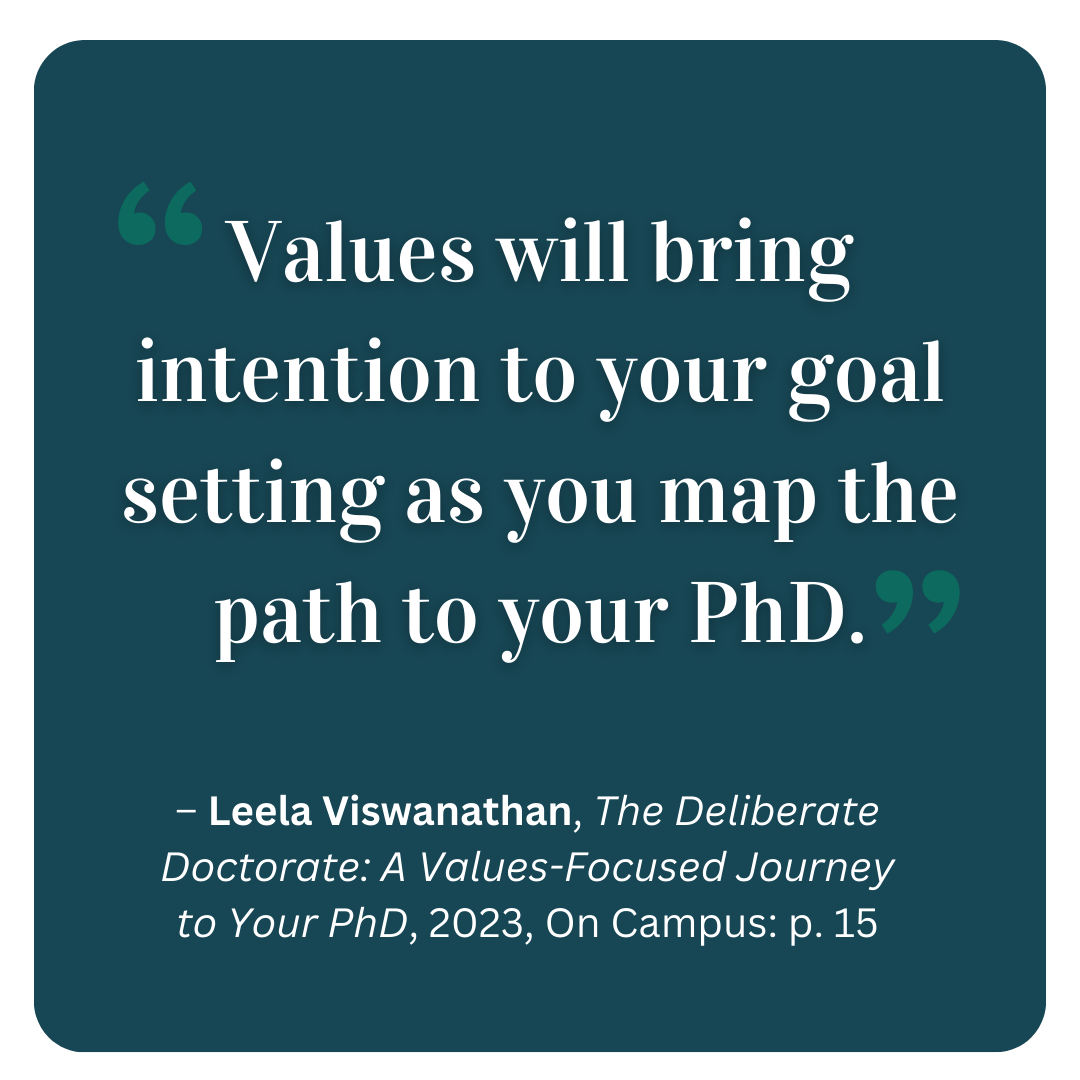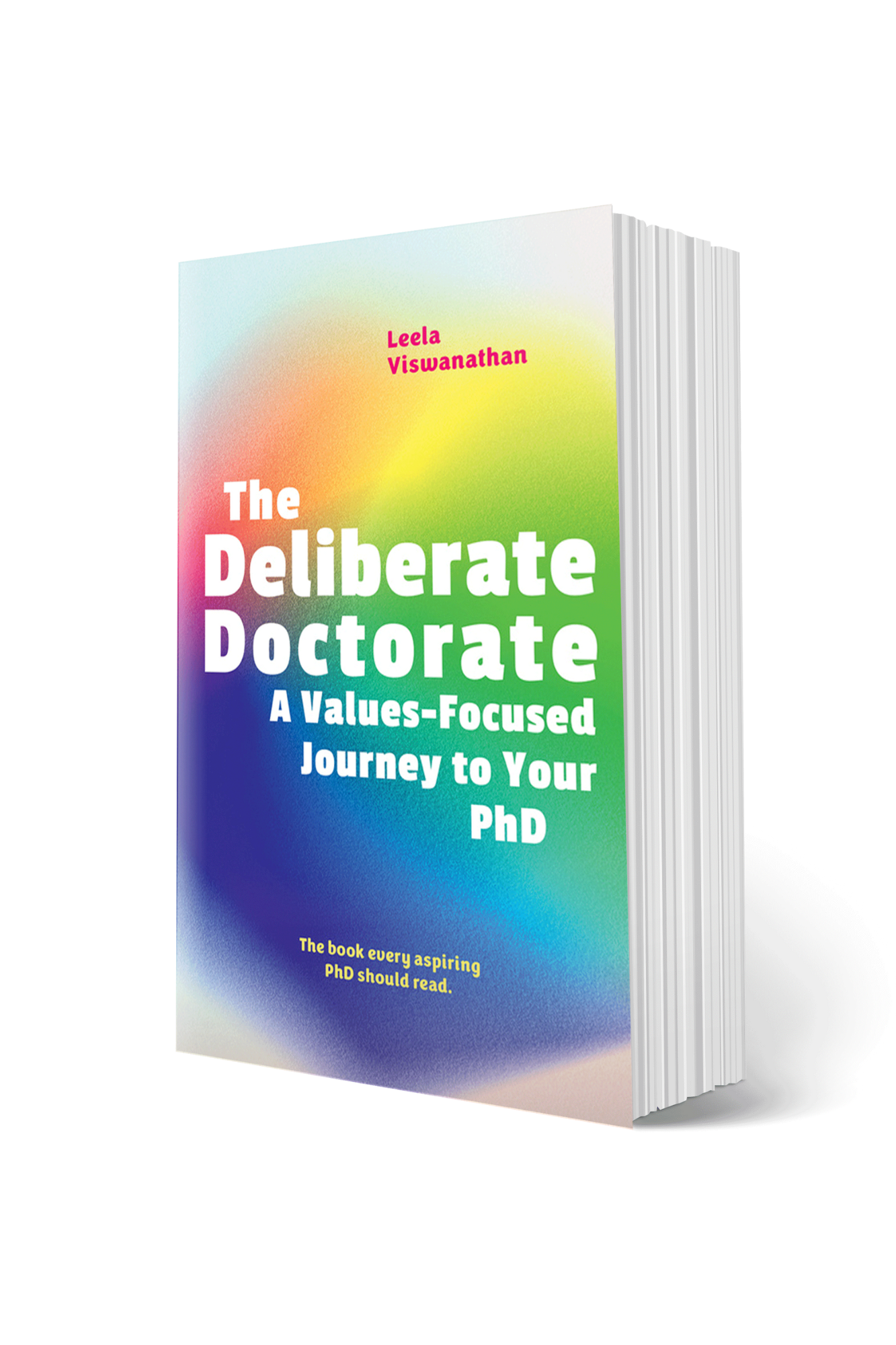Why Your Values Matter on the Journey to Your PhD
Posted: Tuesday, August 01, 2023

We're thrilled to present part one in a three-part series with guest blogger, Leela Viswanathan, author of The Deliberate Doctorate (forthcoming, August 15).
Part two: Emotions and the PhD Student Experience

Universities are goal oriented. As such, earning any university degree, including a doctorate, involves setting goals. Sometimes we set our own goals and sometimes, others – usually people with some authority – set benchmarks for us to achieve or live up to.
I believe that values matter, maybe even more than goals, on the journey to your PhD. When we succeed or fail in our attempt(s) to meet a goal, we might find ourselves lost, without a sense of purpose or a way to learn from our failures, if we don’t have a sense of why we were striving toward that goal in the first place. But if we are deliberate and have first taken the time to explore our values – ways of being true to ourselves – then we can be more open to noticing the universe of possibilities available to us.
You can name and assess your goals to align with your values before you move forward at any point along the journey to your PhD. Or if naming your values proves too difficult, then you can derive values from your goals. Ultimately, it’s vital to appraise your values and how they align with your goals. After all, you will live your values, and practice them, through your behaviours; they are “what guide and motivate you to act.” (p.15). In Chapter 1 of The Deliberate Doctorate, I supply a non-exhaustive list of common values to explore, and you can add more of your own (see pp. 17-18). Then, Chapter 2 shows you how to set about developing goals that align with your values, and if that proves too difficult, then to tease out values from your goals.
Setting boundaries is also linked to values, because like values, boundaries are about behaviours. In turn, learning how to set boundaries can help you to clarify your values, and expectations of yourself, not just when pursuing your PhD, but in other areas of your life too:
Living a values-focused life means living your values in the moment. Your values don't need to be justified, because values are your way of being in the world. Your actions, however, will need to be justified when they impact other people’s time and resources. Living a values-focused life means thinking of values in terms of how they pertain to you and to others. If you're practicing patience, you should be patient with others and yourself.
It might be hard to conceive of your values as being always at your disposal. Choosing to practise or not practise your values may cause you to feel overwhelmed. You might lack resources or the capacity to align your actions with your values. For example, helping others is one of my values, and I choose to do things that help me manifest that value (like writing this book!). However, because I'm human and not a robot I don't always live up to my values when I'm overwhelmed. During times of overwhelm I'm not always present in body and spirit for others, so I must take care of myself first. I might revisit my boundaries, especially if my values shift, and I might reassert my boundaries to better facilitate self-care. Knowing that I can reactivate my values reminds me that the importance I place on helping others need not disappear forever.
Excerpt from Chapter 1 of The Deliberate Doctorate, p. 27.
Remember that values should guide rather than justify your actions. While it can be challenging to discover and practice your values, it’s still worth it, because it means you will know what it takes to be true to yourself, and deliberate in your actions, throughout your PhD journey.
 Leela Viswanathan is author of The Deliberate Doctorate: A Values-Focused Journey to Your PhD, published by On Campus, an imprint of UBC Press, and founder and principal of Viswali Consulting.
Leela Viswanathan is author of The Deliberate Doctorate: A Values-Focused Journey to Your PhD, published by On Campus, an imprint of UBC Press, and founder and principal of Viswali Consulting.
Photo: Jay Fisher, Capture It Photography, Halifax

